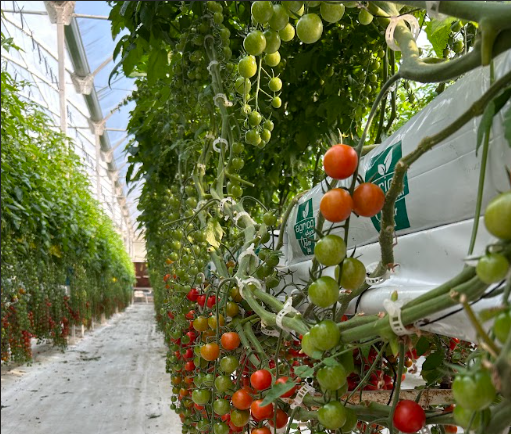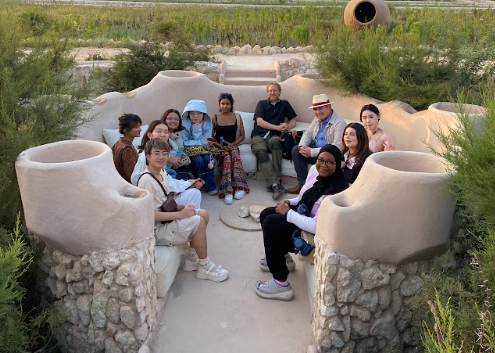Curricular Innovation
At the Office of Academic Services, we support and cultivate curricular innovation that reflects Georgetown University in Qatar’s values of interdisciplinary learning, ethical inquiry, and inclusive education. In collaboration with faculty, we support courses that engage pressing global issues, like climate change, conflict, and social justice, through experiential learning and critical reflection. These courses empower students to connect theory with practice and prepare them to engage thoughtfully with the world around them.
Sustainability & Inclusivity

In this 3 credit course, students participate in the creation of a sensory garden, designed to meet the needs of everyone, including individuals with differing mental or neurological functions. The course provides basic theoretical knowledge about neurodevelopmental differences and both their political and social consequences, for Qatar in particular. While offering the tools to articulate neurodiversity to other social justice movements, the course is also an opportunity to reflect philosophically on notions such as nature, justice, inclusivity, diversity, the body, and the commons. Throughout the semester, students acquire basic knowledge in gardening and are required to participate in all the tasks necessary for the creation and maintenance of the sensory garden.
Education and Conflict
There is growing recognition that education is a casualty of war with long-term consequences for future “lost” generations and the successful rebuilding of crisis-affected communities. Education is critical to mitigate the risks associated with adversity and help children and youth to overcome challenges and build social cohesion. Conflict is one of the key challenges to the successful achievement of the United Nations Sustainable Development Goals of ensuring inclusive and equitable quality education and promoting lifelong learning for all. Education systems and services are significantly impacted in the immediate aftermath of conflict as well as in the longer term. Access to and quality of learning are impaired through the destruction of physical infrastructure, reduced capacity and loss of key resources. Recent regional crises visible throughout the greater Middle East have demonstrated the contextual challenges of education delivery during indefinite displacement of populations. In relation to these themes, this course focusing on Education in Conflict will review the imperative for, and opportunities to protect and sustain education in conflict: including lifesaving and safeguarding aspects, addressing gender impacts of conflict as well as ensuring the knowledge and skills needed to equip children, youth and adults for a sustainable future.
Ecological Belonging
The Ecological Belonging course is a part of the larger Ecological Belonging initiative, anchored by Georgetown University and the Wellbeing Project, and offered to students who have applied for and been accepted as Ecological Belonging Fellows. Iterations of this fellowship and course are in the pilot stage and are being offered to students at multiple universities around the globe. Whenever possible, we pursue opportunities to interact with fellows from other universities. This course is designed to deepen the understanding and transformative work of embedding ecological belonging within cultures and systems. It examines how we can live in a right relationship with all of life through narratives, rituals, practices, and learning. The course encourages students to explore the interconnectedness of humans and the more-than-human world, fostering a sense of ecological belonging and responsibility.

Learning to Learn: Human + AI
This course is structured to have 6 weeks of synchronous instruction and 8 weeks of asynchronous work. It is open to Sophomores, Juniors, and Seniors from all undergraduate schools. The AACU describes lifelong learning as, “all purposeful learning activity, undertaken on an ongoing basis with the aim of improving knowledge, skills, and competence” (AACU). This course aims to make lifelong learning processes comprehensible and visible while helping students use the affordances of AI to develop self-directed learning practices. As access to generative AI has rapidly expanded and even transformed what’s possible in teaching and learning, the use of AI and the ability to learn on one’s own are essential skills for the future. This class encourages students to think critically about human-AI interactions while building familiarity with existing AI tools through innovative AI-enhanced pedagogies and AI-enabled assessments. The aim of the class is to introduce students to how AI models work, contextualize their own learning, and develop paths to self-directed learning in the age of Artificial Intelligence.